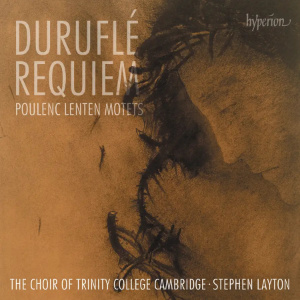
Maurice Duruflé (1902-1986)
Requiem, op.9 (1947/1948)
Francis Poulenc (1899-1963)
Quatre motets pour un temps de pénitence FP97 (1938-1939)
Harrison Cole (organ)
The Choir of Trinity College Cambridge/Stephen Layton
rec. 2021/22, Trinity College Chapel, Cambridge, UK (Poulenc); Church of Saint-Eustache, Paris, France (Duruflé)
Hyperion CDA68436 [56]
You may recall that there are three versions of Maurice Duruflé’s Requiem, op.9. He scored the first for choir and full orchestra. A year later, he arranged it for choir and organ. In 1961, he reworked it for choir, chamber orchestra and organ. This is the second version.
The genesis of the work was the French Vichy government’s 1941 commission for a symphonic poem. Somehow, Duruflé changed his remit to a Requiem. Unbelievably, even though he failed to fulfil his contract, the next government paid him an enhanced fee.
The model is Fauré’s Requiem but this is a respectful tribute rather than an imitation. Duruflé wrote: “I do not think I was influenced by Fauré, contrary to the opinion of certain music critics who, anyway, have never given any explanation for their point of view. I have simply tried to surround myself with the style suitable to Gregorian chants as well as the rhythmic interpretation of the Benedictines of Solesmes.” Each movement is based on Gregorian chant from the Mass for the Dead.
Unlike Berlioz and Verdi, whose Requiems invoke “tragic images of hellfire and heaven storming grief”, Fauré and Duruflé concentrate on rest and peace. Gone are the Day of Judgement texts – Dies Irae – and in comes the optimistic In paradisum.
Any recording of Duruflé’s Requiem must balance its eclectic stylistic characteristics. I have already mentioned the Gregorian rhythms. There are passages that nod to the polyphony of the baroque era. Sheer romanticism is apparent in many passages. Finally, there are parts of this work that reinforce the title of Ronald Ebrecht’s collection of essays: Maurice Duruflé – The Last Impressionist. The latter characteristic is obvious in the Introit and parts of the Sanctus. Texture varies considerably. From a cappella to fully accompanied singing, unison passages, counterpoint, harmony and solos, everything lends a tremendous sense of variety.
I have heard several performances on disc and in the concert hall or church. The Choir of Trinity College Cambridge and Stephen Layton are very impressive here. I suppose any performance must be able to cast its spell on each new generation of listeners and performers.
Conductor Robin Ticciati has described the work as “a balm for the soul, a score filled with tremendous hope and peaceful searching”. This recording offers this consolation. I can ask no more.
There is a decided bonus on the disc: a remarkable performance of Francis Poulenc’s a capella Quatre motets pour un temps de pénitence. Timor et tremor dates from January 1939, Vinea mea electa from December 1938, Tenebrae factae sunt from July 1938, and Tristis est anima mea from November 1938.
As Duruflé did in the Requiem, Poulenc used “found” material in Gregorian plainchant, also from the Mass for the Dead. The four motets create a sense of timelessness. They combine plainchant, sensuous harmonies, wide mood swings and stylistic challenges. This recording emphasises the profundity of Poulenc’s feelings and captures the anxiety in the air at the time of their composition. They are far removed from the “Harlequin Years” of Poulenc’s early piano music.
Roger Nichols’s liner notes in English, French and German give a detailed and helpful introduction to both works. There are the texts are given in Latin and English, as well as useful resumes of the Choir of Trinity College and their director.
This is an ideal recording of Duruflé’s Requiem. The advertisement hits the nail on the head: this work “continues to cast its potent spell over performers and listeners alike. This new recording from Stephen Layton and his Trinity forces fully deserves to be regarded as ‘definitive.’”
John France
Previous review: John Quinn (March 2024)
Help us financially by purchasing from



















